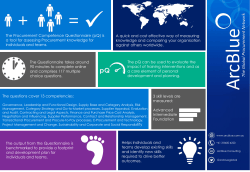
"How digital savvy am I ?" A common EU digital competence
"How digital savvy am I ?" A common EU digital competence framework Lieve Van den Brande, European Commission, DG EMPL Riga, e-Skills for Jobs Conference godelieve.van-den-brande@ec.europa.eu Key messages • Boosting skills for jobs and growth is one of the priorities of Junker's Commission • Digitisation of the economy is transforming European labour markets: growth of high skill occupations + decline in mid- and low skilled • Adequate skills for future employment prospects are crucial: 90% of jobs will require some level of digital skills • ICT is changing working patterns and working envrironments • … and new forms of employment EASQ Key messages • Is education and training preparing people well for all these changes ? • Evidence tells us that too many people in the EU still do not have the skills required ranging from the most basic ones to the transversal skills such as communication, problem solving ,digital competences, initiative taking, etc. • These skills are often acquired through informal and non-formal learning • Critical issue of identification, assessment, recognition and validation … a lot of work to be done EASQ Eurobarometer: Most important skills provided by education and training 4 Skills development Where are they required? Eurobarometer: Education or training provided the necessary skills to find a job in line with qualifications Higher overall agreement: Sweden: 87%, Denmark: 86% and Germany: 85% Lower: Italy: 59%, Spain: 58% and Greece: 55% 5 Skills development Where are they required ? Eurobarometer: Skills that can be acquired outside formal education Skills development Where are they required ? Eurobarometer: Where can these skills can be acquired (outside formal education)? 7 DIGCOMP: A framework for developing and understanding digital competence in Europe Project DG JRC-IPTS on request of DG EAC http://is.jrc.ec.europa.eu/pages/EAP/eLearning.html An encompassing definition Digital competence is the set of knowledge, skills, attitudes, strategies and awareness Learning domains that are required when using ICT and digital media Tools to perform tasks; solve problems; communicate; manage information; collaborate; create and share content; and build knowledge Competence areas effectively, efficiently, appropriately, critically, creatively, autonomously, flexibly, ethically, reflectively for work, leisure, participation, learning, socialising, consuming & empowerment Modes Purpose • 5 Competence areas • More than pure functional ICT skills 2. Communication 2.3 Engaging in online citizenship To participate in society through online engagement, seek opportunities for self-development and empowerment in using technologies and digital environments, be aware of the potential of technologies for citizen participation 5. Problem Solving 5.3 Innovating, creating and solving using digital tools To identify and solve conceptual problems or issues through technological means, to improve and innovate with ICT, to actively participate in collaborative digital and multimedia production, to express him/herself creatively through digital media and technologies, to create knowledge with the support of technologies digital tools Dimension 1 Competence areas (5) 1. Information Dimension 2 Competences (21) 1.1 Browsing, searching, & filtering information 1.2 Evaluating Information 1.3 Storing and retrieving information 2. Communication 2.1 2.2 2.3 2.4 2.5 2.6 Interacting through technologies Sharing information and content Engaging in online citizenship Collaborating through digital channels Netiquette Managing digital identity 3. Content creation 3.1 3.2 3.3 3.4 Developing content Integrating and re-elaborating Copyright and Licences Programming 4. Safety 4.1 4.2 4.3 4.4 Protecting Protecting Protecting Protecting 5. Problem solving 5.1 5.2 5.3 5.4 Solving technical problems Expressing needs & identifying technological responses Innovating, creating and solving using digital tools Identifying digital competence gaps devices data and digital identity health the environment COUNTRY/REGION NEW DEVELOPMENT EUROPEAN ORGANISATION CONSIDERATION ESTONIA Translation of the DIGCOMP by the Ministry of Education and Research. Used for planning teacher PD. FLANDERS, BELGIUM "GO ON UK", UK GO ON UK definition of Basic Digital Skills now aligns with DIGCOMP. Works closely with Cabinet Office and the Governments Digital Service. Used by Dept. of Education as an input to curricula review and to development of adult education courses . Translation of the DIGCOMP framework by the Education Development Centre. SLOVENIA Translated by National Education Institute. The DIGCOMP framework is used for the assessment of students' digital competence. SPAIN CROATIA and SERBIA The Ministry of Education Dept institute INTEF, uses DIGCOMP for teachers PD. Considering translations of DIGCOMP v1.0. BASQUE COUNTRY, SPAIN Ikanos project Developed by the Basque Government to deploy the Digital Agenda. Free online testing tool based on DIGCOMP. DG JUSTICE AND CONSUMERS Development of a Digital Framework for Consumers based on DIGCOMP. EU projects 1) CareNet (Building ICT competences in the care sector to improve the quality of life of older people) applied NAVARRA, SPAIN Navarra Department of Education uses DIGCOMP as a key reference for strategic planning. LITHUANIA MALTA Use of DIGCOMP framework by the Ministry for Education and Employment in "Green Paper: Digital Literacy". DIGCOMP to competence map for care workers and care recipients aged 65+. 2) Carer+ also used the competence map for domiciliary care workers and caregivers. What has been done … • European Digital Competence Framework available on http://portal.empl.cec/Units/C4/Pages/Index.aspx • Endorsed by EU Member States representatives in the E&T2020 Thematic Working group on 'ICT and Education' (May 2013) and on 'Transversal Skills' (2014) • Piloted and embedded in current practices by various MS • Endorsed by ICT-related user and demand industry and ngo's • Self-assessment tool of digital competences for citizens EUROPASS available end 2014 • Wil become part of a one single access point for Citizens skills And more : • Development of applied frameworks for competences and consumer digital competences • Measurement: Eurostat 2015 Survey on digital skills educators digital
© Copyright 2025


















